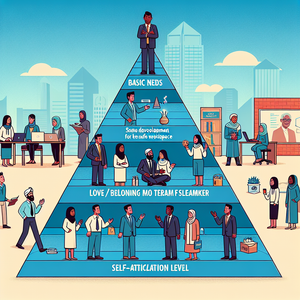
Exploring Career Paths: Key Roles in Employee Motivation Through Maslow's Hierarchy of Needs
Understanding what drives human behavior is crucial, especially in the workplace. Maslow's Hierarchy of Needs, a foundational psychological theory, categorizes human motivations into five levels: physiological, safety, love/belonging, esteem, and self-actualization. This framework not only sheds light on individual growth but also acts as a roadmap for enhancing workplace dynamics. By recognizing and addressing these needs, organizations can create environments where employees feel appreciated, motivated, and engaged. This, in turn, leads to increased productivity and job satisfaction. A variety of roles have emerged from this understanding, each focusing on different aspects of workplace culture and employee engagement. From human resources professionals to organizational development experts, these positions are vital in addressing employee needs and cultivating a nurturing atmosphere. Given the diverse interpretations of Maslow's theory across industries, it's essential to tailor strategies to fit the unique contexts of each organization.
Job Summaries:
Human Resources Manager:
- HR Managers bridge the gap between organizational objectives and employee needs, focusing on safety and belonging.
- By crafting HR policies and managing recruitment efforts, they ensure job security and satisfaction.
- Typically requiring a bachelor’s degree in human resources, this role is instrumental in enhancing employee motivation and retention.
Organizational Development Specialist:
- Specialists in this field work to increase organizational effectiveness through strategic planning and training programs.
- By identifying employee needs, they promote self-actualization and professional development, often requiring a master’s degree in organizational psychology.
- Their contributions are vital in fostering a positive workplace culture and boosting employee engagement.
Employee Engagement Coordinator:
- Focused on uplifting employee morale
- Engagement Coordinators design programs based on survey feedback
- Create supportive environments
- Address belongingness and esteem needs
- A background in business or psychology is crucial
- Strong analytical skills are important for this role
- Essential for talent retention
- Enhances productivity
Training and Development Manager:
- These managers concentrate on employee growth by developing initiatives that facilitate skill enhancement and self-actualization.
- Typically requiring a degree in education or human resources, this role is critical for ensuring that employees feel valued and invested in their professional journeys.
Compensation and Benefits Analyst:
- Analysts design competitive salary and benefits packages to meet employees' safety and esteem needs.
- They conduct market research to ensure that compensation is equitable and appealing.
- A degree in finance or human resources is necessary for this position.
- Strong analytical skills are required for this impactful position.
Workplace Culture Consultant:
- This role involves assessing and enhancing organizational culture to align with employee needs.
- Through workshops and assessments, Culture Consultants promote inclusivity and support.
- Typically requiring a background in psychology or business.
Talent Acquisition Specialist:
- Tasked with sourcing and recruiting talent.
- These specialists ensure that candidates align with organizational values.
- Addressing safety and belonging.
- A degree in human resources or business is essential.
- Excellent communication skills are essential for fostering a cohesive team environment.
Wellness Program Coordinator:
- Coordinators in this role design health initiatives that enhance employee well-being.
- They address physiological and safety needs.
- A degree in health promotion is often required.
- Their holistic approach creates a supportive environment.
- This approach boosts overall employee satisfaction.
Diversity and Inclusion Officer:
- Focused on fostering inclusive workplaces.
- These officers develop policies that promote belonging among diverse employees.
- A degree in human resources or sociology is crucial.
- Experience in diversity initiatives is crucial for enhancing morale and engagement.
Performance Management Specialist:
- Creating performance appraisal systems that help employees reach their potential
- Fostering esteem and self-actualization
- A degree in human resources or organizational psychology is commonly required for this supportive position.
Corporate Trainer:
- Trainers deliver programs designed to enhance employees' skills.
- Addressing self-actualization needs.
- A background in education or human resources is often necessary.
- This role is critical for empowering employees to reach their full potential.
Career Development Advisor:
- Advisors assist employees in mapping out career goals and paths.
- Ensuring alignment with both personal and organizational objectives.
- A degree in counseling or human resources is typically required.
- Supporting self-actualization by guiding employees toward fulfilling careers.
HR Data Analyst:
- By leveraging data to inform HR strategies, these analysts identify trends that support employee needs.
- A degree in data analysis or human resources is essential, providing insights that foster a supportive work environment.
HR Business Partner:
- Working closely with management
- HR Business Partners align HR strategies with business goals
- Ensuring that employee needs are met while driving organizational success
- A degree in human resources or business management is typically required for this pivotal role.
Change Management Specialist:
- Specialists in this area help organizations navigate transitions
- Addressing employee concerns to meet physiological and safety needs
- A background in organizational psychology is advantageous
- Experience in change management is advantageous
- Maintaining morale during shifts is important
Employee Relations Specialist:
- Manage workplace conflicts
- Foster positive relationships between employees and management
- A degree in human resources or conflict resolution is often required
- Directly support safety and belongingness needs
Leadership Development Coach:
- Coaches enhance the skills of current and emerging leaders.
- Focus on professional growth and self-actualization.
- Typically require a background in psychology or business.
- Require coaching certifications.
- Nurtures leadership talent.
Organizational Psychologist:
- By applying psychological principles to workplace dynamics, these psychologists conduct research to enhance employee satisfaction.
- A doctoral degree in psychology is usually required, making this role vital for promoting a healthy workplace culture.
Succession Planning Manager:
- Managers in this role develop strategies for future leadership roles.
- Identifying high-potential employees and creating development plans.
- A degree in human resources or business is often required.
- Contributing to self-actualization by helping employees achieve their career aspirations.
Job Analysis Specialist:
- Specialists assess job roles to determine required skills.
- Creating clear job descriptions that support safety and esteem needs.
- A degree in human resources or organizational behavior is typically necessary for this position.
In conclusion, for those seeking to make a positive impact in the workplace, exploring these roles can lead to rewarding career paths that not only align with personal values but also significantly enhance employee experiences.
Explore More Jobs

